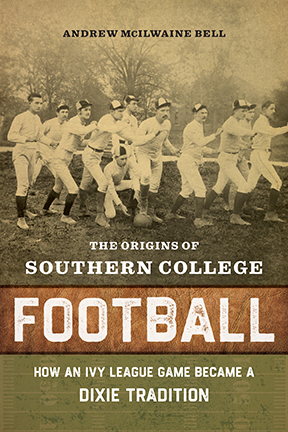
Many of us are missing live sports these days, but what better way to bridge the gap than with the new book from Society member Andrew Bell: The Origins of Southern College Football: How an Ivy League Game Became a Dixie Tradition.
From the publisher:
College football is a massive enterprise in the United States, and southern teams dominate poll rankings and sports headlines while generating billions in revenue for public schools and private companies. Southern football fans worship their teams, often rearranging their personal lives in order to accommodate season schedules. The Origins of Southern College Football sheds new light on the South’s obsession with football and explores the sport’s beginnings below the Mason-Dixon Line in the decades after the Civil War.
Military defeat followed by a long period of cultural unrest compelled many southerners to look to northern ideas and customs for guidance in rebuilding their beleaguered society. Ivy League universities, considered bastions of enlightenment and symbols of the modernizing spirit of the age, provided a particular source of inspiration for southerners in the form of organized or “scientific” football that featured standardized rules and scoring. Transported to the South by men educated at northern universities, scientific football reinforced cultural values that had existed in the region for centuries, among them a tolerance for violence, respect for martial displays, and support for traditional gender roles. The game also held the promise of a “New South” that its supporters hoped would transform the region into an industrial powerhouse. Students and townspeople alike embraced the new sport, which served as a source of pride for a region that lagged woefully behind its northern counterpart in terms of social equity and economic prowess.
The Origins of Southern College Football is an entertaining history of the South’s most popular sport cast against a broader narrative of the United States during the Gilded Age and Progressive Era, two momentous periods of change that gave rise to the game we recognize today.
About the author:
Andrew McIlwaine Bell earned a PhD in history from George Washington University and works at the University of Virginia.
